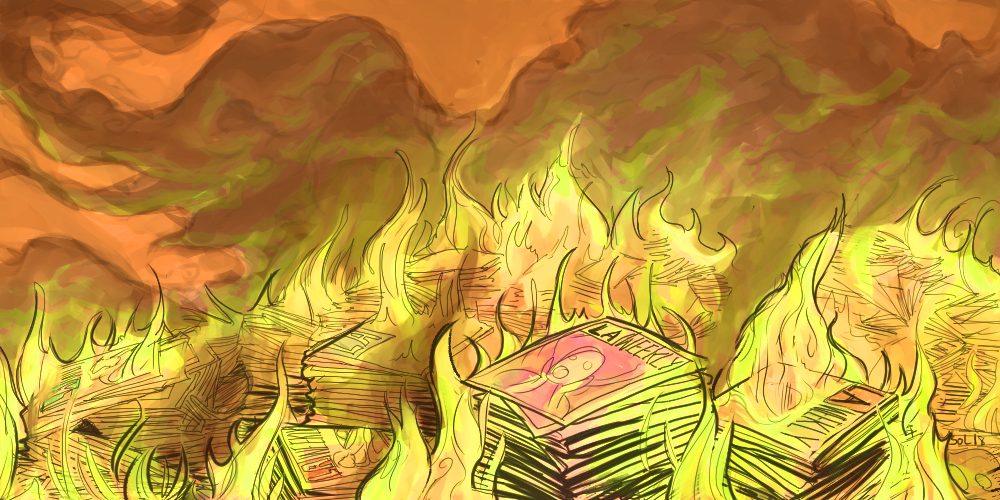Original artwork by Mike ‘SōL’ Person
When LA Weekly was sold toward the end of last year to Semanal Media—an entity created by a group of wealthy conservative investors specifically for the purpose of buying the publication—it prompted the staff to do some investigative reporting on itself and who the new buyers were. That article, Who Owns LA Weekly?, is no longer hosted on the site. And when the new owners took over, they laid off most of the staff, prompting then editor-in-chief Mara Shalhoup to christen the upheaval The Red Wedding, a reference to the popular HBO series Game of Thrones. The sale, investigation, layoffs, and restructuring of the publication was eerily similar to what happened to the Las Vegas Review-Journal when it was bought by casino mogul and major conservative donor Sheldon Adelson in 2015.
Among those laid off was film critic April Wolfe who became a prominent voice pushing back against the new owners and informing the public what was happening. Wolfe continues to write film criticism for outlets such as Village Voice and TheWrap along with a few other exciting projects. Rise Up Daily publisher Shahab Zargari got to speak with her about the sale of LA Weekly and what she is working on now that her time there is over.
***
RUD: Your journey with the LA Weekly ended after the new owners fired 75% of the full time staff late last year. Were you more worried about your sudden unemployment or the apparent right-wing overnight takeover?
April: Having been a worker seasoned in unemployment, I was far less worried about that and was bracing for it as a possibility. But I come from a background of activism and reporting and was shocked to discover the histories of the new owners—at least the ones we know of so far. Most of the time, a new owner will come in, and the editorial vision will mostly be maintained, because they’ll keep some of the old staff and just build on what was working in the first place. In this instance, they nixed everybody who’d maintained the editorial vision and didn’t really give any justifications for it or what direction they wanted to head in, while eventually hiring people solely from the wealthy, right-wing area of Orange County to replace us. While the paper looks like the old Weekly, it’s absolutely different if you read through the articles, which are filled with strange insights and comments that would normally have no place in a weekly paper of repute. One of the first stories they published was a profile on a winery coming back after the big fires in Santa Barbara, but they neglected to mention that the winery is owned by Rupert Murdoch. And normally, LA Weekly would never cover a business that wasn’t inside LA County, because we had an obligation to cover ultra-local ones. It’s all very strange, and I don’t know what’s going to come of it, but I worry, because I’m not sure we’ve reached all the readers to let them know the paper is no longer what it once was.
RUD: A similar buyout happened back in 2015 in Las Vegas when billionaire Sheldon Adleson bought the Las Vegas Review-Journal. Ever since the buyout all the stories and headlines look like they were directly lifted from Fox News—to the point where the views expressed all seem like opinion articles with the intention to convince/convert the reader to the publisher’s way of thinking. Do you think the social media maelstrom you and your fellow ex-coworkers drummed up helped open LA’s (maybe even the nation’s) eyes to the shakedown that occurred or do you think the city on the whole is oblivious to the fact that the headlines and stories are all now conservative-leaning perspectives?
April: I think a lot of people who are engaged on social media are aware of what’s happened, but I don’t believe we’ve reached everyone. What might normally happen if a buyout like this happened is LAist and LA Times would tirelessly investigate the sale to figure out who these guys were—and yes, they are all guys. But LAist had just folded a few weeks earlier, and the Times was embroiled in battles with their new—now old—owners, so the reporting was largely left to the ex-staff and to citizen journalists who researched the new owners and found they were all too comfortable with very far right-wing think tanks, like Gen Next, which one of the new owners founded and which travels the world spreading far-right ideology. It’s disturbing that the story wasn’t picked up more, but local Los Angeles media was caught in a maelstrom.
RUD: Now that some months have passed, what is the biggest chip on your shoulder when it comes to the layoff/ LA Weekly buyout?
April: I guess I wouldn’t phrase it as a “chip,” but I’m really, really concerned about their defrauding of advertisers. When you send out a stat sheet to prospective advertisers, you make note of how many social media followers you have, how many distribution centers you have, and that decides your reach and how much ads are worth. LA Weekly had almost all real, non-bot followers on platforms, equaling up to about 1.5M people. They still have the same numbers, but if you run them through a bot detector, you find that the majority of them are bots. The majority. That’s… outright deception. The Weekly is still trafficking in the reputations of its fired staff as well. All of the old staff’s bios still read that they are currently employed at the paper, which lends legitimacy to their operation if people aren’t aware of what’s happened. I abhor lying and deception, and this seems to be their MO. But mostly I’m angry that Los Angeles no longer has watchdog news writers like they used to. There are significant social and political events happening every single day, and no one from that paper is doing the hard work of reporting them.
RUD: What are you doing now?
April: I was offered a freelancing position the second I got my walking papers, so I don’t know if I ever got time off to process any of this. I got fired and then drove across town to record one of the two film podcasts I do for Maximum Fun. I also have a few of my own scripts in development and plan to direct a feature in the next year or two, depending on financing. It’s a dramatic sci-fi feature with some dark comedy elements, called Heaven for Real.
RUD: Speaking of podcasts, what is the Switchblade Sisters podcast all about?
April: Switchblade Sisters has me interviewing a new female filmmaker every week to talk about their fave genre movie and get into the nitty-gritty of filmmaking processes. Because it’s a little about fandom and a little about craft, we find that a lot of young filmmakers tend to connect with the show, because they might be down on themselves, because this business is hard to break into. But we focus on the work, and what we love about movies, and it’s a very life-affirming show, with some trivia and discussion mixed in.
RUD: Is there a submission system for filmmakers to submit their films for review on the Switchblade Sisters podcast?
April: Basically, you have to be a female-identifying filmmaker, and you have to pitch to my producer, Casey O’Brien. We try to keep a fresh mix of emerging and established artists.
RUD: Do you enjoy the podcast medium?
April: Podcasting has been a great way to meet like-minded listeners. Not that I couldn’t do that with print criticism, but the long form discussion makes it easier to open the door for even more chatting.
RUD: Thank you for taking the time to speak with us! Keep up the great work!








